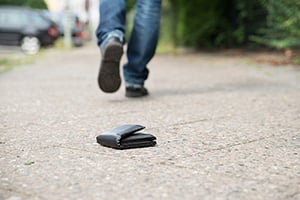Reviewed by: Jeff Norris
Bank and credit union security measures have advanced considerably in recent years, with many financial institutions relying on encryption to protect sensitive account holder information. Encryption uses algorithms to make sensitive data like your login credentials unreadable to third parties. But as mobile and online banking technologies have become more sophisticated, so too have the criminal methods used to defraud consumers.
If you’re wondering, “How can I improve my online banking security?”, here’s what to know about protecting your finances from fraud and scams.
According to the Federal Trade Commission (FTC), over 2.2 million consumers fell victim to fraud in 2022, losing approximately $8.8 billion. Phone scams resulted in the highest per-person losses, with victims losing a median of $1,400. Understanding these common mistakes that make you vulnerable to fraud can help you safeguard your finances.

Monitor your bank accounts regularly, as doing so will help you quickly identify any suspicious or potentially fraudulent activity. Log into your checking and savings accounts daily to review your balances and recent transactions. Contact your bank right away if you see any unexpected transactions, as they can help you resolve the issue.
You often hear about retailers and social networks falling victim to data breaches, with hackers gaining access to consumers’ login credentials and other sensitive information. This is why having unique login credentials—including strong passwords—for your bank accounts is so important.
While having the same easy-to-remember password for every online account may be convenient, it could make you vulnerable to hackers. So, instead of opting for something simple like Password#1, create a unique password for each bank account, and then change that password regularly.
Besides using unique login credentials and strong passwords, you’ll also want to protect your personal information on your laptop, desktop and mobile devices. If possible, avoid using public WiFi, and ensure you have installed anti-virus software or apps. Upgrading to the latest operating systems is also a wise decision, as newer versions of operating systems have the most up-to-date protections. Using a mobile wallet could also help protect your credit card information.
Public social media profiles can also make you a target for hackers. Many fraudsters use a technique called spearfishing, which involves harvesting personal information shared on an individual’s social media account and then using it to tailor an email communication that appears to be from a trustworthy source. The emails often contain malicious links that appear to direct you to legitimate websites requesting personal information like login credentials, credit card numbers or bank account numbers.
For instance, a hacker might access a tagged photo of you and a work friend in front of your office, and then spoof an email from that friend with realistic details like your company logo or address. The email might suggest that your friend is organizing a catered lunch for a colleague, for example, and contain a link to a fraudulent site that requests your credit card information.
Spearfishing attacks have become more popular recently, and setting your public social media profiles to private can offer added protection.
If you’d like to bank on the go from your smartphone, ensure you download the correct mobile banking app. Chances are your bank’s mobile app is available in Google Play or the App Store, but your financial institution’s official website should also have a link to its mobile app. Going straight to the source—banks and credit unions—can help you avoid mistakenly downloading the wrong app elsewhere.
Besides avoiding these common online banking mistakes, other measures can also safeguard your accounts. Take the following steps for added precautions:
1. Choose strong passwords and use two-factor or multi-factor authentication - Besides using strong passwords, you’ll also want to take advantage of 2FA or MFA. These technologies generate a unique code sent via email or text message that you enter as an added layer of protection. You can also use a password manager and lock your phone or tablet with a passcode for additional security.
2. Avoid using public WiFi and rely on virtual private networks (VPNs) - Public WiFi doesn’t offer the same level of security as private WiFi, as anyone can access the wireless connection without a password. If you need to use public WiFi, rely on a VPN to help protect your information. VPNs use encryption technology to protect your computer’s IP address and your location. It’s also vital to avoid inputting sensitive information while using a public hotspot.
3. Set up banking alerts - Set up online and mobile banking alerts. These alerts can keep you informed of recent transactions, including deposits and payments, and let you easily view your balances.
4. Keep your smartphone secure - Also consider using the biometric technology built into your smartphone. Many devices allow you to use facial recognition or fingerprinting to open your phone, which can help ensure that nobody else can access your phone.
5. Watch out for phishing scams - While spearfishing has become increasingly common, old-fashioned phishing scams still happen too. Like spearfishing, phishing scams often encourage you to click a malicious link in an email. But these scams typically aren’t personalized. For instance, a hacker might send a carefully crafted email that appears to be from a large financial institution to thousands of recipients, hoping that they click on a malicious link and provide personal information.
6. Keep antivirus software up to date - It’s easy to skip software updates because these updates can be somewhat inconvenient. That said, updating your antivirus software is essential for protecting your devices. Updates often address potential security vulnerabilities, helping ensure you’re safe as you browse online. Learn more about which software updates are needed and other application updates to look out for here.

7. Choose trustworthy financial apps - Look for trustworthy financial apps that have implemented security features like encryption technology and 2FA or MFA. Before downloading anything, ensure the app is legitimate. Rather than downloading an app through a third-party website, consider downloading your financial institution’s mobile app through their official website.
Online banking and mobile banking are convenient ways to access your accounts. These options let you track purchases, pay bills and view your balances whenever you’d like. Although online and mobile banking have advanced security measures such as encryption, it is still crucial to take proactive steps to safeguard yourself.
For more information about online banking security tips, visit the Seacoast Fraud Protection Resource Center.
Topics: Protect Your Finances, Cybersecurity Tips
Are you interested in contacting a local, Florida banker to discuss your individual financial needs? We’d love to speak with you. Schedule a consultation today.
Share: